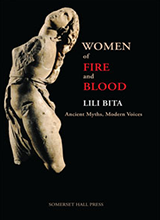Lili Bita - Women of Fire and Blood. Reviewed by William Burrison
Lili Bita’s Women of Fire and Blood (Somerset Hall Press, 2007) has some fractured, fairytale, revisionist fun with her collection of poems about eleven antique female figures of Greek folk and literary lore: Medea, Daphne, Hypatia, Eurydice, Jocasta, Helen, Cassandra, Hecuba, Iphigenia, Clytemnestra, and Phaedra. All are, more or less, mixes of the mythic/supernatural and the real/historical.
For instance, in this poetry collection, Daphne knows to elude Apollo’s advances by his “flaunting of a cigarette” and “second-rate cologne.” Helen insists that Paris, despite what “history, in its dementia, raves,” didn’t kidnap her. Especially arresting is Bita’s giving voice to Jocasta, Cassandra, Hecuba, Phaedra (most erotic, anti-tabooistic), and Iphigenia (most moving, daughter to father).
As Bita’s poem about Medea reminds us, this lore feeds off of regicide, matricide, patricide, infanticide, incest, rape, and cannibalism. So, the fun of this collection is far from Bacchanalian frivolity, but more like darkly ironic, wrathy grapes of comeuppance. Or, at least, cries of moral outrage by complex, shadowy damsels defending their reputations against a male determined posterity.
The book’s cover, showing a mutilated sculpture of a maenad lit up against a black backdrop (head, eyes, twisted upward as if beseechingly to the gods) is certainly true to the horrific tone of the monologue-like gallery therein.
Bita’s take on these eleven women of antiquity shouldn’t be taken as the last word on such figures. But it is intelligently provocative and artful enough to inspire further, perhaps alternative, variations. Nor should one deny Bita – also an actress, a stage interpreter of such women, and a gifted writer who was raised on the Greek isle of Zakynthos – a certain insider’s deference.
There are many classic lines worthy of the classical male tragedians in this spare work, translated by
Dr. Robert Zaller. Or closer to Sappho. Among my favorites: “What need have I of nets,/ knives, poison? I have/ what I need, these ten/ strong fingers clenched tight/ for years, waiting, lover for you.” (Clytemnestra, to Agamemnon.) “Who are you, Apollo?”/ A vagrant from Olympus/ … Isn’t truth/ the ghost of our fears/ that follows us everywhere?... When my name’s pronounced/ people spit on the ground/ so the demons will absorb/ my deadly truth.” (The accursedly clairvoyant Cassandra.) And, “I don’t know which God/ spins our fates, and then twists them/ into riddles,/ casting them at life to solve/ in human folly.” (Jocasta. Poor Oedipus!)

